-
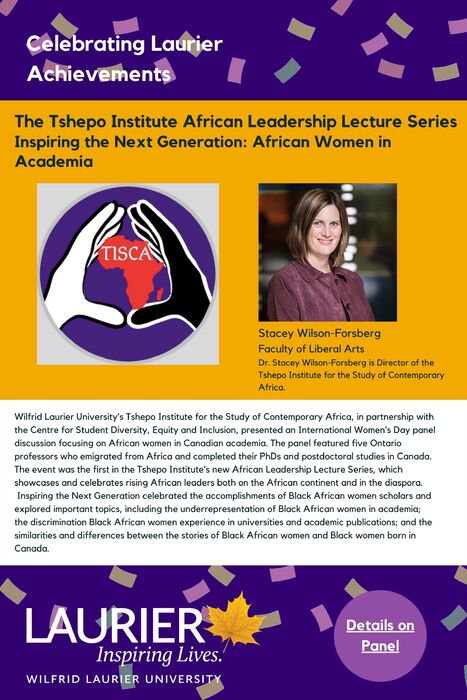 The Tshepo Institute African Women Leaders Public lectures: Inaugural lecture - Inspiring the Next Generation: African Women in Academia
The Tshepo Institute African Women Leaders Public lectures: Inaugural lecture - Inspiring the Next Generation: African Women in Academia Wilfrid Laurier University’s Tshepo Institute for the Study of Contemporary Africa, in partnership with the Centre for Student Diversity, Equity and Inclusion, will present an International Women’s Day panel discussion focusing on African women in Canadian academia. The panel will feature five Ontario professors who emigrated from Africa and completed their PhDs and postdoctoral studies in Canada. The event is the first in the Tshepo Institute’s new African Leadership Lecture Series, which showcases and celebrates rising African leaders both on the African continent and in the diaspora. nspiring the Next Generation celebrated the accomplishments of Black African women scholars and explored important topics, including the underrepresentation of Black African women in academia; the discrimination Black African women experience in universities and academic publications; and the similarities and differences between the stories of Black African women and Black women born in Canada.
-
The School and Labour Market Transitions of African Youth in Canada
On average, immigrants tend to be better educated than non-immigrant Canadians, an outcome that is at least partly due to Canada’s immigrant selection rules in the economic stream, which favour education.
Our research has shown that while many students face academic challenges in transitioning to high school and university, including those related to course selection, a lack of guidance both at school and home when making decisions is particularly pronounced for Black African youth with refugee backgrounds.
Beyond mentorship and tailored information about educational choices and career possibilities, African youth also need the tools, training, and confidence to make their own educational and career decisions.
This paper and lecture provided an overview of our research with African youth, highlighting projects designed with our community partners to build the skills and confidence among the youth and their parents to make decisions that affect their education and lives.
-
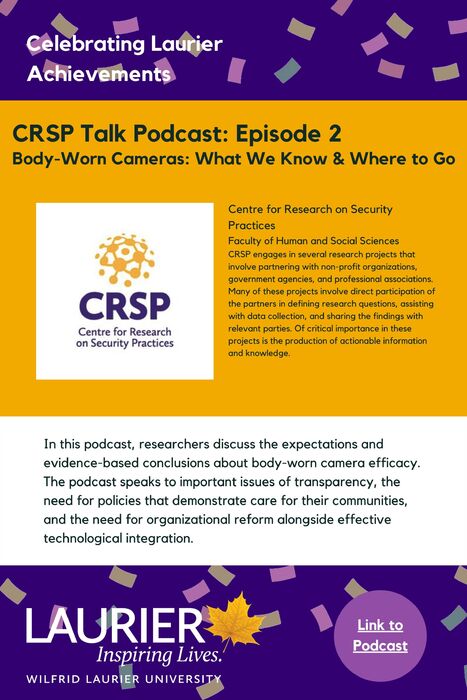 Body-Worn Cameras: What We Know and Where to Go
Body-Worn Cameras: What We Know and Where to Go
-
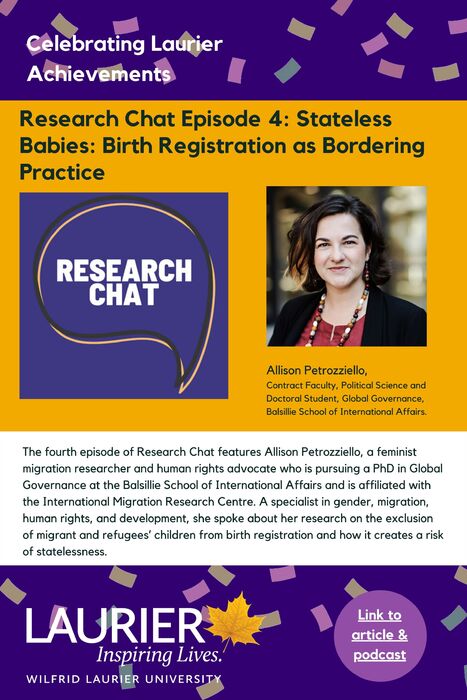 Research Chat Episode 4: Stateless Babies: Birth Registration as Bordering Practice
Research Chat Episode 4: Stateless Babies: Birth Registration as Bordering Practice The fourth episode of Research Chat features Allison Petrozziello, a feminist migration researcher and human rights advocate who is pursuing a PhD in Global Governance at the Balsillie School of International Affairs and is affiliated with the International Migration Research Centre. A specialist in gender, migration, human rights, and development, she spoke about her research on the exclusion of migrant and refugees’ children from birth registration and how it creates a risk of statelessness.
-
 Handpicked: Stories from the Field
Handpicked: Stories from the Field Handpicked: Stories from the Field features stories about sustainable food systems research and action affiliated with the Laurier Centre for Sustainable Food Systems. The podcast series includes conversations with researchers, community partners, students, and food systems actors.
-
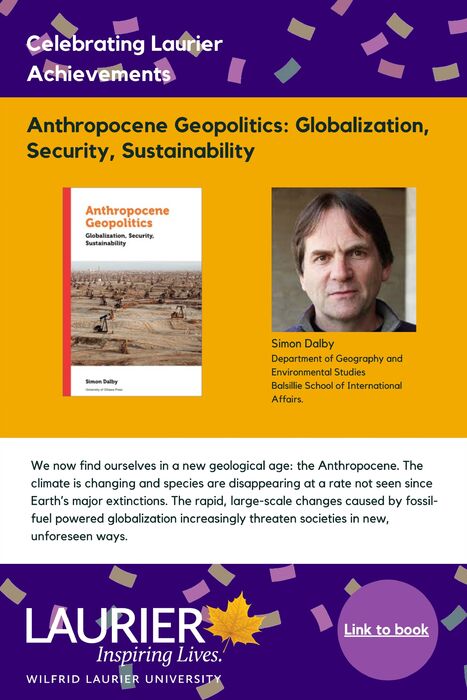 Anthropocene Geopolitics
Anthropocene Geopolitics We now find ourselves in a new geological age: the Anthropocene. The climate is changing and species are disappearing at a rate not seen since Earth’s major extinctions. The rapid, large-scale changes caused by fossil-fuel powered globalization increasingly threaten societies in new, unforeseen ways.
-
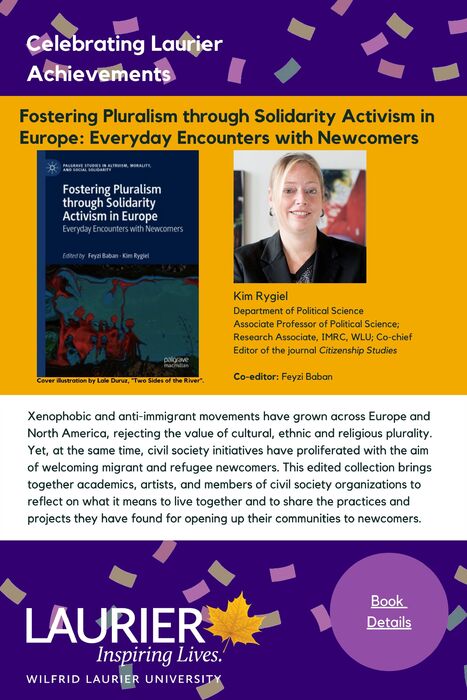 Fostering Pluralism through Solidarity Activism in Europe Everyday Encounters with Newcomers
Fostering Pluralism through Solidarity Activism in Europe Everyday Encounters with Newcomers Xenophobic and anti-immigrant movements have grown across Europe and North America, rejecting the value of cultural, ethnic and religious plurality. Yet, at the same time, civil society initiatives have proliferated with the aim of welcoming migrant and refugee newcomers. This edited collection brings together academics, artists, and members of civil society organizations to reflect on what it means to live together and to share the practices and projects they have found for opening up their communities to newcomers.
-
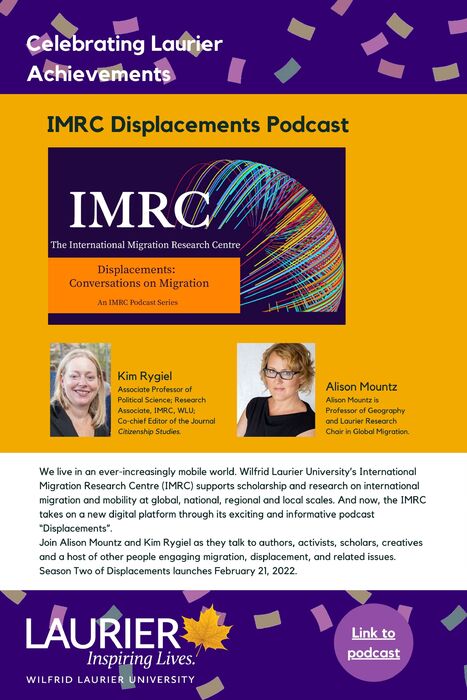 The Death of Asylum: Hidden Geographies of the Enforcement Archipelago
The Death of Asylum: Hidden Geographies of the Enforcement Archipelago Alison Mountz traces the global chain of remote detention centers used by states of the Global North to confine migrants fleeing violence and poverty, using cruel measures that, if unchecked, will lead to the death of asylum as an ethical ideal.
The Death of Asylum won the 2020 Globe Award from the Association of American Geographers for advancing public understandings of geography.
 The Tshepo Institute African Women Leaders Public lectures: Inaugural lecture - Inspiring the Next Generation: African Women in Academia Wilfrid Laurier University’s Tshepo Institute for the Study of Contemporary Africa, in partnership with the Centre for Student Diversity, Equity and Inclusion, will present an International Women’s Day panel discussion focusing on African women in Canadian academia. The panel will feature five Ontario professors who emigrated from Africa and completed their PhDs and postdoctoral studies in Canada. The event is the first in the Tshepo Institute’s new African Leadership Lecture Series, which showcases and celebrates rising African leaders both on the African continent and in the diaspora. nspiring the Next Generation celebrated the accomplishments of Black African women scholars and explored important topics, including the underrepresentation of Black African women in academia; the discrimination Black African women experience in universities and academic publications; and the similarities and differences between the stories of Black African women and Black women born in Canada.
The Tshepo Institute African Women Leaders Public lectures: Inaugural lecture - Inspiring the Next Generation: African Women in Academia Wilfrid Laurier University’s Tshepo Institute for the Study of Contemporary Africa, in partnership with the Centre for Student Diversity, Equity and Inclusion, will present an International Women’s Day panel discussion focusing on African women in Canadian academia. The panel will feature five Ontario professors who emigrated from Africa and completed their PhDs and postdoctoral studies in Canada. The event is the first in the Tshepo Institute’s new African Leadership Lecture Series, which showcases and celebrates rising African leaders both on the African continent and in the diaspora. nspiring the Next Generation celebrated the accomplishments of Black African women scholars and explored important topics, including the underrepresentation of Black African women in academia; the discrimination Black African women experience in universities and academic publications; and the similarities and differences between the stories of Black African women and Black women born in Canada. Body-Worn Cameras: What We Know and Where to Go
Body-Worn Cameras: What We Know and Where to Go  Research Chat Episode 4: Stateless Babies: Birth Registration as Bordering Practice The fourth episode of Research Chat features Allison Petrozziello, a feminist migration researcher and human rights advocate who is pursuing a PhD in Global Governance at the Balsillie School of International Affairs and is affiliated with the International Migration Research Centre. A specialist in gender, migration, human rights, and development, she spoke about her research on the exclusion of migrant and refugees’ children from birth registration and how it creates a risk of statelessness.
Research Chat Episode 4: Stateless Babies: Birth Registration as Bordering Practice The fourth episode of Research Chat features Allison Petrozziello, a feminist migration researcher and human rights advocate who is pursuing a PhD in Global Governance at the Balsillie School of International Affairs and is affiliated with the International Migration Research Centre. A specialist in gender, migration, human rights, and development, she spoke about her research on the exclusion of migrant and refugees’ children from birth registration and how it creates a risk of statelessness. Handpicked: Stories from the Field Handpicked: Stories from the Field features stories about sustainable food systems research and action affiliated with the Laurier Centre for Sustainable Food Systems. The podcast series includes conversations with researchers, community partners, students, and food systems actors.
Handpicked: Stories from the Field Handpicked: Stories from the Field features stories about sustainable food systems research and action affiliated with the Laurier Centre for Sustainable Food Systems. The podcast series includes conversations with researchers, community partners, students, and food systems actors. Anthropocene Geopolitics We now find ourselves in a new geological age: the Anthropocene. The climate is changing and species are disappearing at a rate not seen since Earth’s major extinctions. The rapid, large-scale changes caused by fossil-fuel powered globalization increasingly threaten societies in new, unforeseen ways.
Anthropocene Geopolitics We now find ourselves in a new geological age: the Anthropocene. The climate is changing and species are disappearing at a rate not seen since Earth’s major extinctions. The rapid, large-scale changes caused by fossil-fuel powered globalization increasingly threaten societies in new, unforeseen ways. Fostering Pluralism through Solidarity Activism in Europe Everyday Encounters with Newcomers Xenophobic and anti-immigrant movements have grown across Europe and North America, rejecting the value of cultural, ethnic and religious plurality. Yet, at the same time, civil society initiatives have proliferated with the aim of welcoming migrant and refugee newcomers. This edited collection brings together academics, artists, and members of civil society organizations to reflect on what it means to live together and to share the practices and projects they have found for opening up their communities to newcomers.
Fostering Pluralism through Solidarity Activism in Europe Everyday Encounters with Newcomers Xenophobic and anti-immigrant movements have grown across Europe and North America, rejecting the value of cultural, ethnic and religious plurality. Yet, at the same time, civil society initiatives have proliferated with the aim of welcoming migrant and refugee newcomers. This edited collection brings together academics, artists, and members of civil society organizations to reflect on what it means to live together and to share the practices and projects they have found for opening up their communities to newcomers. The Death of Asylum: Hidden Geographies of the Enforcement Archipelago Alison Mountz traces the global chain of remote detention centers used by states of the Global North to confine migrants fleeing violence and poverty, using cruel measures that, if unchecked, will lead to the death of asylum as an ethical ideal. The Death of Asylum won the 2020 Globe Award from the Association of American Geographers for advancing public understandings of geography.
The Death of Asylum: Hidden Geographies of the Enforcement Archipelago Alison Mountz traces the global chain of remote detention centers used by states of the Global North to confine migrants fleeing violence and poverty, using cruel measures that, if unchecked, will lead to the death of asylum as an ethical ideal. The Death of Asylum won the 2020 Globe Award from the Association of American Geographers for advancing public understandings of geography.